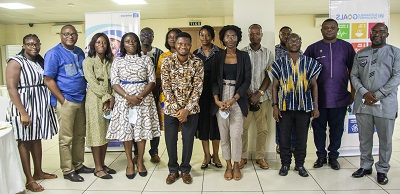
The United Nations Educational, Scientific, and Cultural Organisation (UNESCO) has hosted a national capacity-building workshop in Ghana to support the country to develop SMART (Specific, Measurable, Attainable, Relevant and Timely) policies.
This would ensure that Science, Technology and Innovation (STI) were reflected across all sectors of the economy.
The two-day hybrid workshop held in Accra in December formed part of an on-going project in six African countries (Congo, Ghana, Namibia, Sierra Leone, Tanzania and Zimbabwe) funded by the Swedish International Development Cooperation Agency (SIDA).
It aimed at strengthening national and regional STI policies and governance and institutions in research and innovation in line with the UNESCO Recommendation on Science and Scientific Researchers (RS|SR).
The RS|SR is a standard-setting instrument adopted in 2017 by all UNESCO member-states, including Ghana, to serve as a checklist in ensuring that societies use knowledge from all scientific fields responsibly, protect scientific researchers’ rights and conditions, and provide adequate financial and institutional support to scientists.
Addressing participants, UNESCO’s Science Policy Consultant, Guillermo Lemarchand explained the key concepts of STI policies and policy instruments, using global and regional examples; as well as the methodological approach and analytical units of UNESCO’s Global Observatory of Science, Technology, and Innovation Policy Instruments (GO-SPIN).
Discussing Ghana’s Gross Domestic Expenditure on Research and Experimental Development (GERD), Mr Lemarchand noted that the country’s R&D strength appeared to be skewed toward medical research.
He emphasised the importance of the government, in partnership with the private sector, investing more in diverse scientific research to reduce the country’s reliance on foreign aid for its R&D.
The Deputy Director of the STI Directorate at the Ministry of Environment, Science, Technology, and Innovation (MESTI), Mr Cephas Adjei Mensah; spoke about the measures the ministry and its agencies were undertaking with the support of UNESCO to strengthen the country’s STI system.
Participants for the two-day workshop which was held on December 17 and 20, 2021 included representatives from MESTI, Council for Scientific and Industrial Research (CSIR), CSIR – Science and Technology Policy Research Institute (STEPRI), Ghana Statistical Service, Kwame Nkrumah University of Science and Technology (KNUST), Environmental Protection Agency (EPA) and National Development Planning Commission (NDPC).
The rest are CSIR-Soil Research, Food and Drugs Authority (FDA), Ministry of Communication and Digitisation, African Institute of Mathematical Sciences (AIMS)-Ghana, Ashesi University, Ghana Institution of Engineering (GhIE), Forum for Agricultural Research in Africa (FARA), University of Ghana, Ghana Atomic Energy Commission (GAEC), Association of Ghana Industries (AGI), Institute for Sustainable Energy and Environmental Solutions (ISEES), UNESCO Accra Office and the media.
BY ANDREW NORTEY






